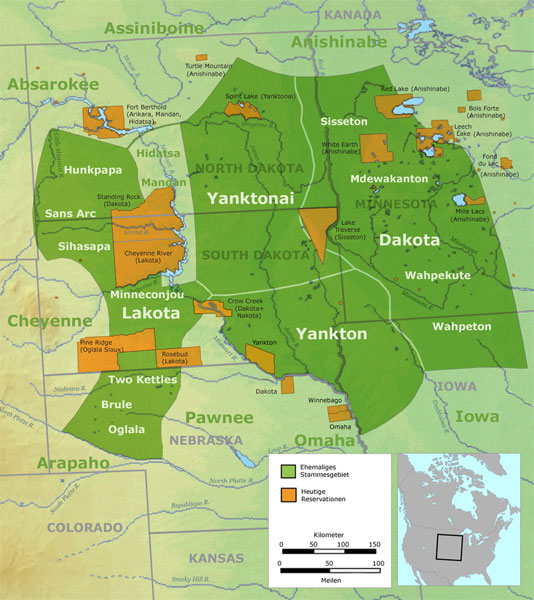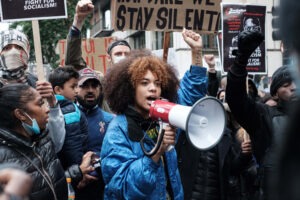
May 3, 2019; Washington Post
Relations between the Oglala Sioux (Oglala Lakota Nation) and state leaders in South Dakota are getting worse. Just about a month ago, as NPQ reported, the ACLU in South Dakota filed suit against several laws that had been passed in the legislature. Two were aimed at protesters, allowing the state to sue individuals and organizations engaging in “riot-boosting,” which High Country News defines as encompassing “the actions both of protesters who participate in ‘riots’ as well as anyone who ‘does not personally participate in any riot but directs, advises, encourages, or solicits other persons participating in the riot to acts of force or violence.’”
These laws targeted protesters of the Keystone XL Pipeline. Now, the Oglala Sioux, whose land the pipeline would cross, have sent a letter telling South Dakota’s Governor Kristi Noem she’s not welcome on their reservation. The current dispute brings up three key issues. One is that the Oglala Sioux see the Keystone XL Pipeline as a breach of their treaty with the United States, as it would cross the Pine Ridge Reservation, their tribal lands, without their permission. Another is that the recent laws are viewed as suppressing free speech by both the Oglala Sioux and the ACLU. The third concerns the relationship between American Indian nations and the legislators in the United States.
Not long ago, the Oglala Sioux had welcomed Noem onto the Pine Ridge Reservation in the wake of flooding. Since then, Noem has apparently visited the reservation on a few occasions and has been speaking with tribal members. She saw this as building relationships with members of the tribe, according to a statement from her office. However, according to the letter and Chase Iron Eyes, public relations liaison for Julian Bear Runner, the Oglala Sioux’s president, Gov. Noem made these visits without notifying Bear Runner or other Oglala Sioux leaders, a lapse in diplomatic courtesy.
Sign up for our free newsletters
Subscribe to NPQ's newsletters to have our top stories delivered directly to your inbox.
By signing up, you agree to our privacy policy and terms of use, and to receive messages from NPQ and our partners.
In March, relations with Noem began to fray. On February 27th, Noem called for a celebration of “State-Tribal Relations Day.” The ceremony would involve raising the flags of all the tribal nations that share land with South Dakota. One week later, the anti-riot-boosting law was announced and rushed through the legislature. Two of the tribes immediately pulled out of the ceremony, asking that their flags not be raised, and two more tribes joined them soon afterwards.
The new letter makes it clear in no uncertain terms that Gov. Noem is no longer welcome on Oglala Sioux land and that if she does not respect this order, which was adopted unanimously by the Tribal Council, she could suffer further admonishment. The next step would be formal banishment, which is a serious and formal process.
The anti-riot-boosting legislation is called out in the letter as a major reason for the tribe’s action. To make amends, the governor would have to rescind her support of the two bills that reference protesters in particular, and affirm her belief in the importance of political free speech.
Just days after Noem’s legislation was passed, President Trump signed an executive order granting permission for TransCanada to go ahead with the $8 billion proposed pipeline, an attempt to bypass a legal delay in Montana. South Dakota’s concerns are next on the agenda to get the pipeline through, and Noem is working hard to smooth the path. As NPQ wrote last month, this all represents an attack on speech rights and the climate, all in the name of protecting private property and big business. We must pay attention.—Rob Meiksins













